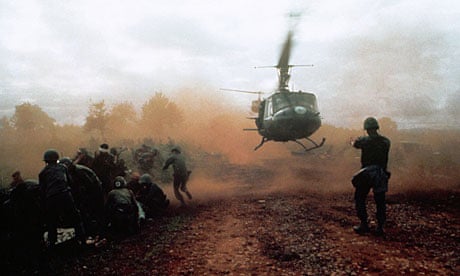One of the many interesting things about reading through past Hugo award-winners chronologically is the light they shine on the recent past – even if most of them are set in the distant future. The Forever War, a 1974 science fiction novel by Joe Haldeman is a case in point. Like the 1960 winner, Robert Heinlein's Starship Troopers, it is, as the author says in a recent foreword to the book: "mainly about war, about soldiers and about the reasons we think we need them."
Crucially, though, it's also about the cataclysm Haldeman's generation went through in the 16 years since Heinlein's gung-ho classic won the approval of the Hugo voters. "It's about Vietnam," says Haldeman, "because that was the war the author was in".
Like so many others, Haldeman was conscripted against his will, plunged into horror, wounded and dropped back into a society that now felt alien to him. The Forever War is a clear attempt to come to terms with that experience – even if it's set light years away. In 1997, the novel's hero William Mandella (a near anagram of the author's full name Joe William Haldeman) becomes one of the first batch of recruits sent into the far reaches of space to do battle with a clone-based species called The Taurans.
He hates fighting – but finds the return to earth even more upsetting. Only two years have passed for him, but thanks to a quirk of relativity and the fact that he's been travelling near the speed of light, a full decade has passed on earth. He can't fit in. It's too violent, too many customs have changed (even his own mother has adopted the kind of homosexual relationship encouraged by authorities eager to control the population) and too few people understand what he has gone through.
So he re-enlists and spends several more years of his life, and several hundred years on earth, fighting in a war he doesn't understand, against an enemy he doesn't dislike, watching almost everyone he knows get blown to pieces.
The writing is admirably matter-of-fact and concentrates more on vivid description than overt emotion, but that just makes the controlled fury of the narrator's voice all the more stark. Mandella, it's safe to say, does not enjoy being a soldier. It's not surprising, therefore, that the book is often described as the anti-war answer to Starship Troopers – but that's an oversimplification.
Much of the book seems to have been positively inspired by Heinlein's bug-blasting epic – and the two share many virtues. Just as in the earlier novel, some of the best sequences in The Forever War centre around brutal boot camps and futuristic military equipment. Both writers also share an ability to invoke the thrill and fear of blowing shit up. Small surprise then that far from disparaging Heinlein, Haldeman actually said he treasured a letter Heinlein sent him complimenting The Forever War more than the awards the book won. They didn't agree on politics – but they did have a lot in common.
Indeed, Haldeman also shares Heinlein's enthusiasm for investigating alternative sexual mores. The homophobic Mandalla doesn't just have to cope with his mother becoming a lesbian. One of the biggest future shocks he receives is to return from a mission and discover that the entire planet has gone gay thanks to selective breeding and eugenics. Thanks to his desire for women, Mandalla finds himself labelled an "old queer" and in the unusual position of wanting to discover if any of his female shipmates might have a bit of "latent heterosexuality". Plenty of this material is amusing and well-handled. It's certainly an interesting reply to the 1970s military's ban on homosexuality and adds to Mandalla's terrible sense of isolation. But plenty of it is daft too. Haldeman's future gay men are prone to mincing and wearing make-up – elements that even the author says seem embarrassing to him now. In 2002, he even said: "I'm certain that if I wrote it today, I wouldn't have this feminisation of the gay people."
There are other slightly silly elements to the book. Mandalla's first return to earth is particularly problematic. A series of deaths and disasters (that all fortuitously happen in the short time he is on the planet and not in the preceding 10 years) give the section a contrived and overwrought air, while the chaos in society isn't adequately explained or realised. But it's churlish to concentrate on the negative. Haldeman nods now and again, but that hardly diminishes the power of The Forever War. This is an enraged and enraging classic that deserves a place alongside Apocalypse Now and The Deer Hunter as an expression of the pain caused by Vietnam.
Next time: Kate Wihelm – Where Late The Sweet Birds Sang

Comments (…)
Sign in or create your Guardian account to join the discussion